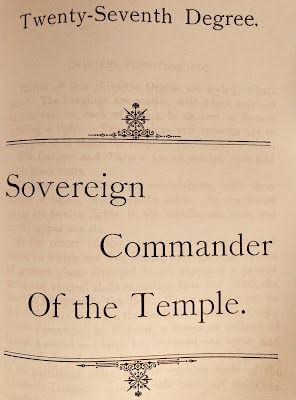Tuesday, September 14, 2021
‘Three Distinct Raps’
I hearby promise and swear, etc., etc., that the Grand College of Rites is not asking me to promote its latest edition of Collectanea. It’s just that this volume of Cerneau Scottish Rite rituals keeps coming to mind, so here is the third Magpie post in two weeks inspired by book.
This time, it is the action in the Twenty-Seventh Degree, “Sovereign Commander of the Temple,” I recollect thanks to current events.
Judaism’s holiest day begins tomorrow night. Yom Kippur is a day for fasting and atonement. (Please don’t wish your Jewish friends a “Happy Yom Kippur.” It’s not a celebratory holiday.) The atonement aspect, as I understand it, isn’t merely making apologies as needed to wipe clean a slate for the year only to repeat the same kinds of infractions during the coming twelve months, but instead the goal is to advance spiritually, morally, and psychologically so you wouldn’t replicate those same errors. Simple, right?
So what has this to do with a neo-templar degree of the Cerneau Scottish Rite from 1807? Well, there’s this:
In “Sovereign Commander of the Temple,” a Prince of Mercy from the preceding degree is received into a small, entirely blackened room. His conductor, an officer titled Draper, seats the Prince at a small black table that holds certain ritual elements. The Draper instructs the aspirant to use paper and pen to answer these questions:
Have you done any wrong or injury to anyone without atoning for it by repentance, and, if possible, by making amends?
If you have done wrong or injury to anyone, without making amends, and it has not now become impossible to do so, write to the party a letter, confessing the wrong, and promising to make amends, or doing so, if it can be done, by letter. If you have atonement to make to more than one, answer whether what you thus do in one case you will do at the earliest opportunity in all. Seal, if you choose, your letter, since we do not demand to know its contents, but answer briefly hereunder, what you do and promise.
Have you any enmity towards, or feud with, anyone, that you would not readily abandon if you found him sincerely willing to be reconciled to you?
If you have any quarrel with a Mason of any degree of the Ancient and Accepted Scottish Rite, write to him now a letter offering reconciliation and the right hand of fellowship. Seal your letter, and answer what you have done, and, if you have more than one such quarrel, whether you will do the same in every such case.
The action continues. When finished, the Prince shall signal with “three distinct raps upon the table.” The answers (but not the confidential letters, if any) are read aloud in the Chapter by the Chancellor. But, if there are no admitted wrongdoings; if there is no professed intentions to atone; and if making amends is not desired, then the Draper will release him to depart in peace, without advancing in the degree.
Labels:
27º,
Collectanea,
GCR,
Joseph Cerneau,
Ritual,
Scottish Rite
Subscribe to:
Post Comments (Atom)































































No comments:
Post a Comment